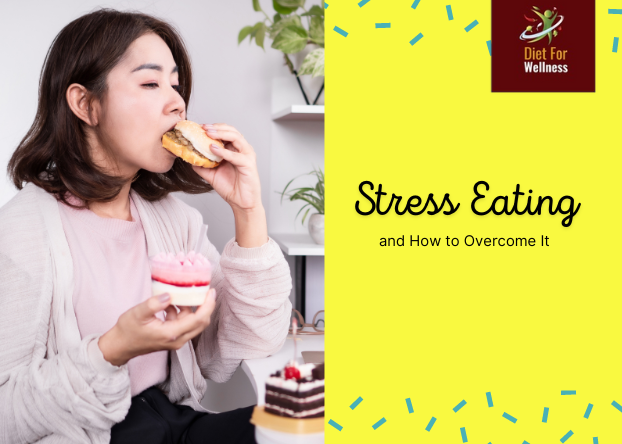Stress Eating and How to Overcome It

Stress eating, also known as emotional eating, is a common behavior where individuals consume food, typically high in sugar, fat, or both, in response to stress or emotional distress rather than hunger. Most of the time we eat to satisfy physical hunger, but stress eating is driven by emotional triggers like frustration, anxiety, sadness, or boredom. While it can offer temporary relief or distraction, it often leads to guilt, weight gain, and unhealthy eating habits.
Why Does Stress Eating Happen?
- Emotional Comfort- Eating food, especially comfort foods like sweets, fast food, or snacks, can temporarily alleviate stress by releasing feel-good chemicals like dopamine.
- Hormonal Changes- Stress triggers the release of cortisol, a hormone associated with increased appetite and cravings for unhealthy food.
- Distraction- Eating can serve as a way to distract the mind from the stressful situation, providing an emotional escape.
- Habit Formation- Over time, using food to cope with stress can become habitual, making it difficult to break the cycle.
Effects of Stress Eating
- Weight Gain- Overeating, especially high-calorie foods, can lead to excess weight and obesity.
- Nutritional Imbalance- Stress eating often involves consuming foods low in nutritional value, leading to deficiencies in essential nutrients.
- Mood Swings- While stress eating may provide temporary relief, the guilt or frustration afterward makes the stress worse and negatively affects mental health.
- Increased Risk of Chronic Conditions- Continuous stress eating may contribute to conditions like diabetes, heart disease, and metabolic disorders.
How to Overcome Stress Eating
Breaking the cycle of stress eating requires awareness, healthier coping mechanisms, and lifestyle changes.
Tips to help you regain control over emotional eating
- Recognize the Triggers
The first step in overcoming stress eating is identifying what triggers the behavior. Is it work stress, relationship issues, boredom, or fatigue? Keeping a food diary can help you spot patterns between emotions and eating habits.
- Find Alternative Coping Mechanisms
Instead of turning to food, find healthier ways to cope with stress
- Exercise- Physical activity releases endorphins that can improve mood and lessen stress.
- Mindfulness Practices- Meditation, deep breathing, and yoga help calm the mind and increase awareness, preventing impulsive eating.
- Journaling- Writing down your thoughts and emotions can help you process stress without using food as a crutch.
- Mindful Eating
Mindful eating involves paying attention to the food you’re eating, savoring each bite, and recognizing physical hunger cues. By slowing down and enjoying your food, you are more likely to stop when you’re full and avoid emotional overeating.
- Stay Hydrated
Sometimes, thirst is mistaken for hunger. Ensure you are drinking enough water throughout the day to prevent unnecessary snacking due to dehydration.
- Eat Balanced Meals
A balanced diet rich in fiber, protein, and healthy fats helps stabilize blood sugar levels and keeps you feeling full longer. This can reduce the likelihood of cravings and emotional eating.
- Get Adequate Sleep
Lack of sleep increases stress levels and alters hunger hormones, making you more prone to overeating. Aim for 7-9 hours of sleep per night to maintain both physical and mental health.
- Limit Access to Junk Food
Reduce the temptation by keeping your home stocked with healthier snacks, like fruits, nuts, and yogurt. If junk food isn’t easily accessible, you’re less likely to indulge in stress eating.
- Seek Professional Support
If stress eating is significantly impacting your health or well-being, consider speaking with a therapist or counselor. Cognitive behavioral therapy (CBT) can help address the underlying emotional triggers and teach new coping strategies.
Stress eating is a common but unhealthy way of coping with emotional distress. By recognizing triggers, practicing mindful eating, and developing healthier coping mechanisms, you can break the cycle and regain control over your relationship with food. It’s not about depriving yourself—it’s about nurturing your body and mind in a healthier way.

Hey people!!!!!
Good mood and good luck to everyone!!!!!